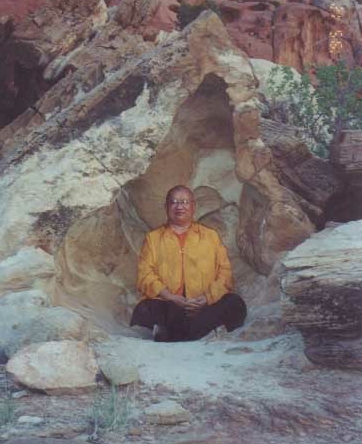Khenpo Konchog Monlam
མཁན་པོ་དཀོན་མཆོག་སྨོན་ལམ།
mkhan po dkon mchog smon lam
Short Biography
Khenpo Konchog Monlam was born to Kyashog Sherab Gyaltsen and Ngoza Tsering Paldon in 1940 at the place called Chitod Dronmey, Kham Nangchen (Eastern Tibet). He grew up in his parent's house and spent his childhood helping his family. He became a monk at the age of 13 and began learning primary studies (reading, writing and ritual) in the Drikung Kagyu monastery of Lho Lungkar Gompa.
Due to terrible changes in the region because of Chinese invasion, he had to flee his country at the age of 18. He visited all the holy pilgrimage sites in Nepal and India on his way in to exile, and finally reached Tso Pema, where Guru Rinpoche transformed the fire into a lake when the King of Zahor tried to burn him alive, when he was 20.
There he received preliminary instructions on the Longchen Nyingthig teachings from Pomda Khenpo and Dzigar Lama Wangdor and then stayed in retreat for one year doing ngondro practice as had been advised by Drikung Khandro. Drikung Khandro also advised him to seek out and study with the great Nyingma master, Khenchen Thupten Ozer. At the age of 25, Khenpo took both Genyen (begining level buddhist vows) and Getsul (novice) monk vows from Khenchen Thupten Ozer and then at 26 he took Gelong vows (full monk ordination) with his root guru.
He received most teachings from his root guru Khenchen Thupten Ozer Rinpoche, the well-learned and highly acclaimed scholar of Dzogchen Shri Singha Institute in Tibet. He also received teachings from many great master like, HH the 14th Dalai Lama, HH Dudjom Jigdral Yeshe Dorje Rinpoche, Dilgo Khyentse Rinpoche, HH Sakya Trizin, Drikung Chetsang Rinpoche, Khunu Lama Tenzin Gyaltsen , Nyoshul Khenpo Rinpoche, Tulku Urgyen Rinpoche, Dodrupchen Rinpoche, Taklung Tsetrul Rinpoche, Trulshik Rinpoche, Penor Rinpoche and many other master. At the same time he was helping his root guru to look after the affairs of his monastery Pangang Ritod which is located in Manali (Northern India).
At the age of 40, in 1978, he was initiated as a Khenpo and enthroned by his root guru and named Khenpo Konchog Monlam. Since then he started giving teachings at his monastery in Manali and in Tibet at Lho Lungkar monastery. At the same time he also gave teachings to the local Tibetans at the Tibetan settlement in Bir.
In the year 1985, he went back to Tibet to visit relatives who stayed behind there. During his one year stay in Tibet, he gave reading transmissions for both the Mani Mantra and Vajra Guru Mantra and more than a thousand committed to Khen Rinpoche that they would give up alcohol and tobacco. While in Tibet he went on pilgrimage to Lhasa, Tsang, Drikung, and many other holy places, to pay respect and make offerings.
In 1987 he took the responsibility of Head Khenpo for nine years and taught the first batch of students at the Drikung Kagyu Institute, at Jangchub Ling, established by HH Drikung Chetsang Rinpoche. He then joined the late Tulku Urgyen Rinpoche and Tulku Chokyi Nyima Rinpoche in their Dharma activities when asked by Urgyen Rinpoche to look after the affairs of Nagi Gompa Nunnery in Nepal. Teaching the nuns and leading rituals until 2000.
Khen Rinpoche established his own retreat center "Ngodrup Charbeb Ling Retreat Center" in 1998. It is located on the west side, about 300 meters from the holy Swayambhunath Stupa, the most sacred Buddhist site in the Kathmandu valley of Nepal. To this date, there has been one set of monks and two set of nuns to have completed the traditional 3 year and 3 month retreat in the Longchen Nyingthig lineage under the guidance of Khenpo Konchog Monlam. Now there is a third set of nuns starting their retreat in November 2008, and 18 nuns studying Buddhist philosophy, ritual and sciences, as well as English and Chinese languages.
Written by the masters humble student [BL]
Literary Works
Main Teachers
- Khenchen Thupten Ozer
- Khunu Lama Tenzin Gyaltsen (kunu bla ma bstan 'dzin rgyal mtshan)
- Dodrupchen Thupten Thrinley Palzang
- Chatral Sangye Dorje
- Dilgo Khyentse
